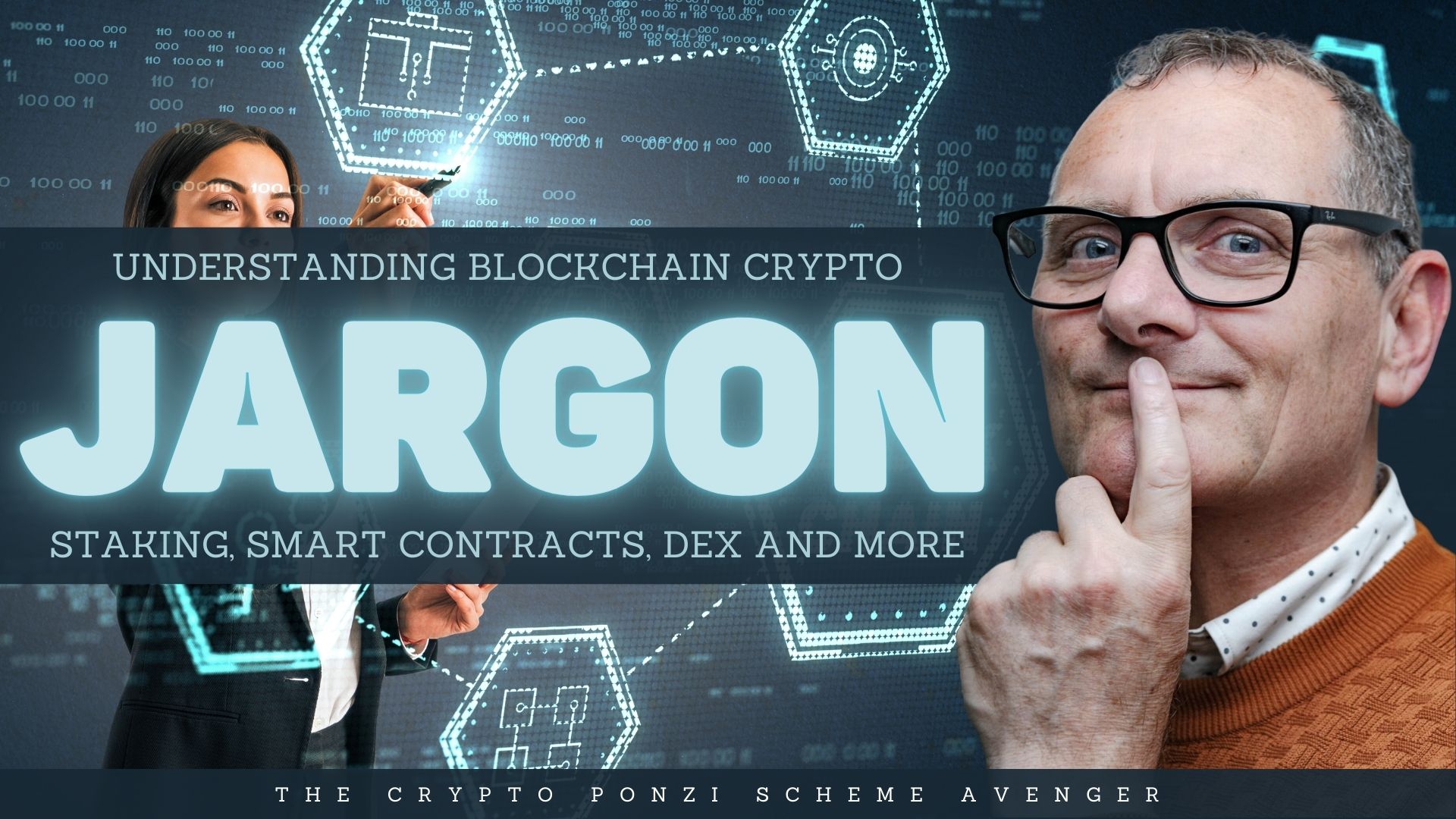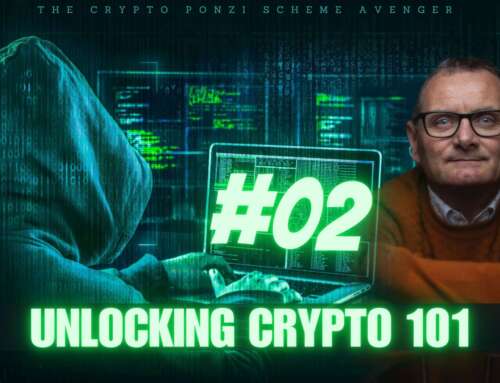I’ve been producing a lot of videos on my YouTube Channel exposing Ponzi Schemes and Scams. I have been struggling to get my head around some of the terminology, I used some clever AI and had an article written on “Crypto Jargon” it may also help you, as well as myself.
Cryptocurrency, also known as digital or virtual currency, is a form of decentralized currency that uses cryptography for security. The crypto industry, also known as the blockchain industry, is a rapidly growing and evolving field that encompasses a wide range of technologies, concepts, and terminology.
Here are some key terms used in the crypto industry:
- Blockchain: A blockchain is a decentralized, distributed ledger that records transactions across a network of computers. It is the technology that underpins most cryptocurrencies.
- Bitcoin: Bitcoin is the first and most well-known cryptocurrency. It was created in 2009 by an unknown individual or group using the pseudonym Satoshi Nakamoto.
- Altcoins: Altcoins, or alternative coins, are any cryptocurrency other than Bitcoin. Some popular altcoins include Ethereum, Ripple, and Litecoin.
- Wallet: A digital wallet is a software program that stores a person’s public and private keys and interacts with various blockchain to enable transactions.
- Mining: Mining is the process by which transactions are verified and added to the blockchain through complex mathematical calculations. Miners are rewarded with newly minted coins for their work.
- Token: A token is a digital asset that represents a specific asset or utility. Tokens can be used to represent anything from a physical asset like gold to a virtual asset like a video game item.
- ICO: Initial coin offering (ICO) is a fundraising method used by startups to raise capital for their projects. Investors purchase tokens in exchange for cryptocurrency or fiat currency.
- Fork: A fork is a split in the blockchain that occurs when a group of users disagree on the direction of the project and create a new version of the software. This can lead to the creation of a new cryptocurrency.
- Decentralized finance (DeFi): DeFi refers to the movement to create decentralized, open-source financial products and services on the blockchain. These include lending and borrowing platforms, trading platforms, and more.
- Decentralized: Decentralized refers to a system or network where power or authority is distributed among multiple actors rather than being held by a single central entity. This means that the control and decision-making process is spread out among many participants, rather than being controlled by a single authority.
- Decentralisation: Decentralisation refers to the process of distributing power, authority, or decision-making responsibility away from a central authority or entity to multiple actors. It aims to increase the participation of individuals or groups in decision-making and promote greater accountability, transparency, and equality in the distribution of resources and power.
- Staking: Staking refers to the process of holding and actively supporting a particular cryptocurrency by locking up a certain amount of coins as collateral. By doing so, users can earn rewards in the form of newly minted coins or transaction fees. Staking is commonly used in proof-of-stake (PoS) blockchain networks, where users can earn rewards for verifying transactions rather than mining them.
- MetaMask: MetaMask is a browser extension and mobile wallet that allows users to easily interact with decentralized applications (dApps) on the Ethereum blockchain. It allows users to store and manage their private keys, and to interact with dApps without having to run a full Ethereum node.
- Smart contracts: Smart contracts are self-executing contracts with the terms of the agreement written into lines of code. They are stored on the blockchain, which makes them secure, transparent, and tamper-proof. Smart contracts are commonly used in decentralized finance (DeFi) to create decentralized lending and borrowing platforms, trading platforms, and more.
- Exchanges: A cryptocurrency exchange is a platform that allows users to buy, sell, and trade cryptocurrencies. Some popular exchanges include Binance, Coinbase, and Kraken.
- Market cap: Market capitalization (market cap) refers to the total value of a company’s outstanding shares of stock or a cryptocurrency. In the case of a company, it is calculated by multiplying the total number of outstanding shares by the current market price per share. In the case of a cryptocurrency, it is calculated by multiplying the current price of a single unit by the total number of units in circulation. Market cap is used to compare the relative size or popularity of different companies or cryptocurrencies and track changes in their overall value. However, it is just one metric and should be considered alongside other factors when evaluating the value or potential for growth of a company or cryptocurrency.
- PancakeSwap: PancakeSwap is an automated market maker (AMM) decentralized exchange (DEX) built on the Binance Smart Chain (BSC). Users can trade various token and assets with each other in a trustless and decentralized manner. PancakeSwap is known for its low transaction fees and fast execution of trades.
- MetaVerse: The MetaVerse is a concept in science fiction and technology that refers to a virtual world or shared space where users can interact with each other and digital objects in a simulated environment. It often imagines a decentralized, open-source virtual reality platform where users have complete control over their online identity and data. The MetaVerse is typically seen as a decentralized and interconnected network of virtual spaces, where users can interact with each other, engage in virtual commerce, and participate in a variety of activities. The concept of a MetaVerse has inspired numerous technological innovations, including virtual reality, augmented reality, and blockchain-based platforms.
- Crypto EcoSystem: The crypto ecosystem refers to the interconnected network of people, organizations, technologies, and processes involved in the creation, exchange, and use of cryptocurrencies. It encompasses a wide range of activities, including the development of blockchain technology, the creation of new cryptocurrencies, the exchange and trade of these currencies, and the development of decentralized applications that use cryptocurrencies as a form of payment. The crypto ecosystem also includes related businesses, such as wallet providers, exchanges, and mining operations, as well as regulatory bodies and advocacy groups that seek to shape the future of cryptocurrencies. Overall, the crypto ecosystem is characterized by its decentralized nature, its use of cryptographic techniques for security, and its reliance on blockchain technology for record-keeping and transparency.
This is just a small sampling of the many terms used in the crypto industry. As the field continues to evolve, new terminology will likely emerge and existing terms may take on new meanings. It’s important to stay up to date with the latest developments in order to fully understand and participate in the crypto industry.
It’s worth noting that the crypto industry is always changing, so some of the details and context of these terms may evolve over time. It’s important to stay informed about the latest developments in the field to fully understand and participate in the crypto industry.
P.S. If you like this article, please click “like” or provide comment, as that will motivate me to publish more. Share and inspire. Thank you.








Leave A Comment